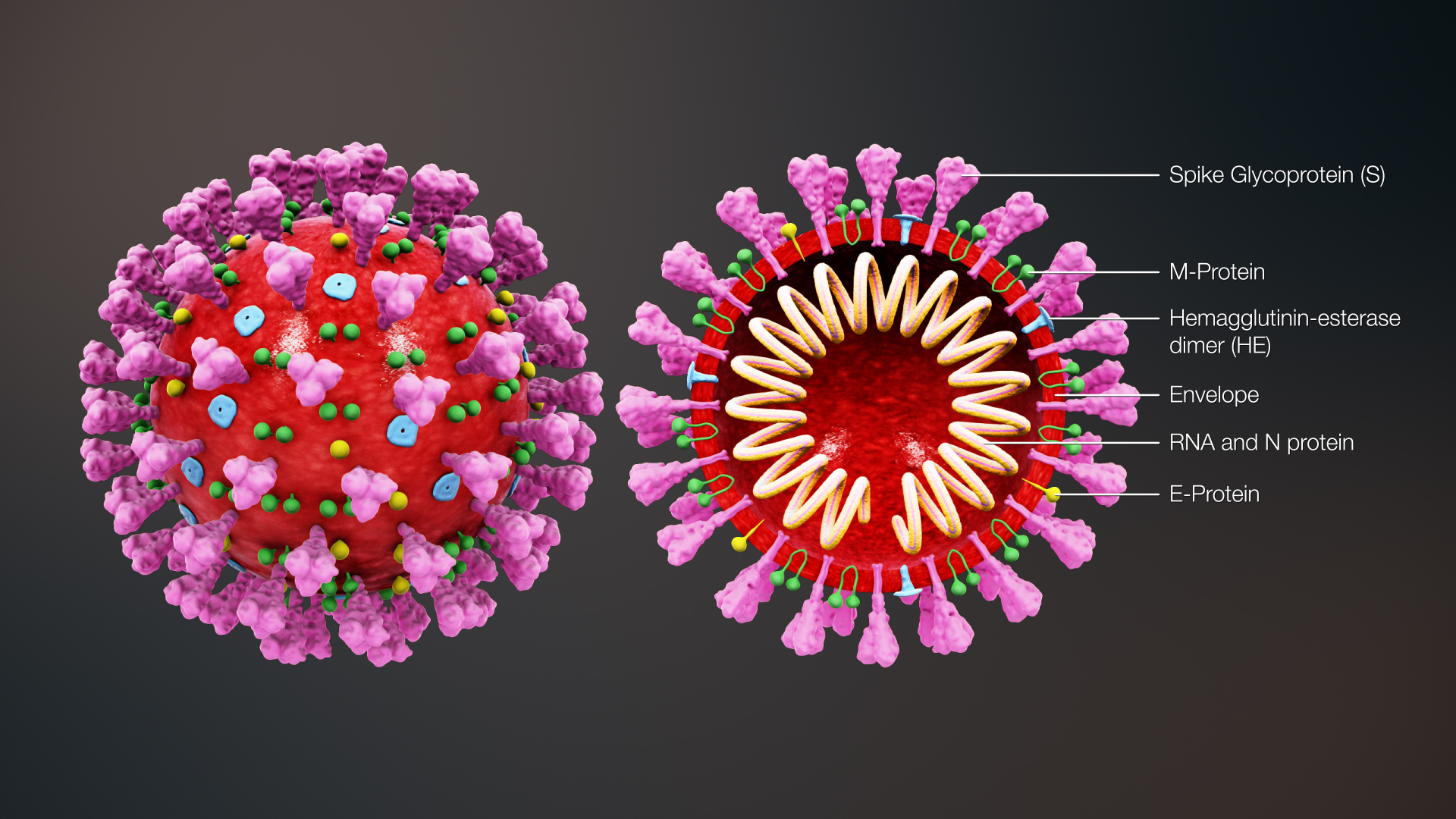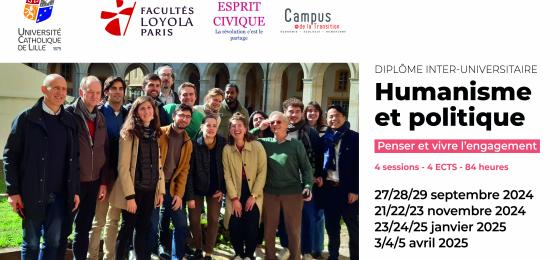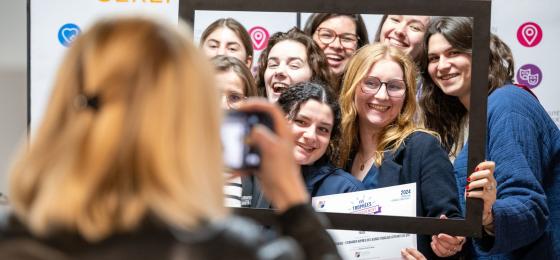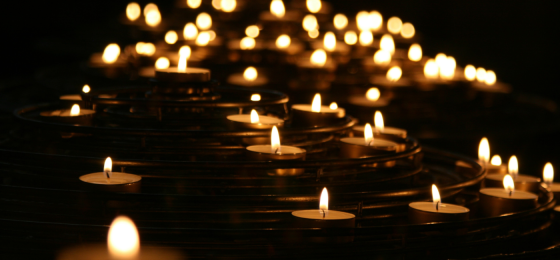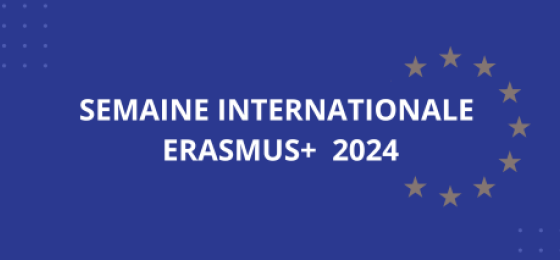Communication Covid-19 - 22 March 2022
Update from Campus France - 14 March 2022
TRAVEL TO FRANCE: INFORMATION FOR INTERNATIONAL STUDENTS AND RESEARCHERS
For more information, please consult Campus France's webpage.
Update from French Government; Campus France; APUAF COVID-19 Committee - Last Updated: 22 March, 2022
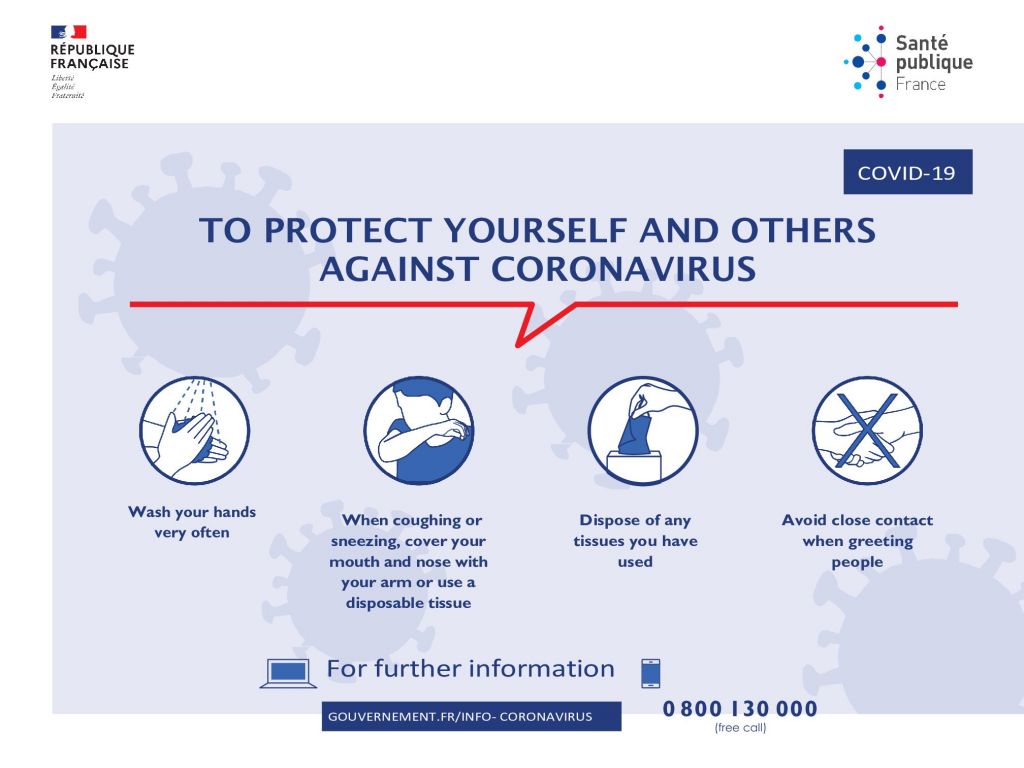
INTERNATIONAL MOBILITY
Who is authorized to travel to France?
Since February 12, new simplified rules apply at borders. Two main factors impact the travel restrictions:
- Whether the traveler is vaccinated or unvaccinated
- Where the traveler is coming from: the color-coded classification according to the level of COVID in each country
Fully vaccinated travelers can enter France with proof of complete vaccination. No other restriction applies.
Unvaccinated travelers :
- arriving from a “green” country
- must present a negative antigen test (48 h prior to departure) or PCR test (72h prior to departure) to enter France (departure from the first flight in the event of a connection) but test and isolation upon arrival are lifted.
- arriving from an “orange” country
- Must show a compelling reason for travel to France (see list below)
- must present a negative antigen test (48 h prior to departure) or PCR test (72h prior to departure) to enter France (departure from the first flight in the event of a connection)
- a sworn statement attesting to the absence of symptoms of covid-19 infection and contact with a confirmed case of Covid-19 to enter the metropolitan territory.
- Be subject to random testing upon arrival
- Must isolate in case of a positive result accordingly to the health measure in France at the time of arrival.
https://www.interieur.gouv.fr/covid-19-international-travel
Countries are listed as Green or Orange/Amber, depending on the level that COVID is circulating in each country.
Color Codes as of March 14:
Green: no or little viral circulation:
- Countries of the European area: Member States of the European Union as well as Andorra, Iceland, Liechtenstein, Monaco, Norway, San Marino, Switzerland and the Vatican, South Africa, Angola, Saudi Arabia, Argentina, Bahamas, Bahrain, Bangladesh, Belize, Benin, Bolivia, Botswana, Bhutan, Burkina Faso, Burundi, Brazil, Cambodia, Cameroon, Canada, Cape Verde, Colombia, Comoros, Congo, Ivory Coast, South Korea, Cuba, Djibouti, l Egypt, United Arab Emirates, Ecuador, Eswatini, United States, Ethiopia, Fiji, Gabon, Ghana, Guinea, Equatorial Guinea, Guinea Bissau, Honduras, Hong Kong, Mauritius, India, Indonesia, Iraq, Jamaica, Japan, Kazakhstan, Kenya, Kuwait, Laos, Lesotho, Madagascar, Malawi, Morocco, Mauritania, Mozambique, Myanmar (formerly Burma), Namibia, Nepal, Nicaragua, Niger, Nigeria, New Zealand, Oman, Uganda, Pakistan, Panama, Paraguay, Peru, Philippines, Qatar, the Republic. Democratic Republic of Congo, Dominican Republic, Rwanda, Saint Kitts and Nevis, El Salvador, Samoa, Senegal, Seychelles, Sudan, South Sudan, Sri Lanka, Taiwan, Tanzania, Chad, East Timor, Togo, Tunisia, Vanuatu, Venezuela, Vietnam, Zambia and Zimbabwe
Orange/Amber: a moderate and “controlled” level of viral circulation:
- All countries that are not currently classified as “Green”.
Websites where details and updates can be found:
www.diplomatie.gouv.fr/en/coming-to-france/coronavirus-advice-for-foreign-nationals-in-france/
https://www.interieur.gouv.fr/Actualites/L-actu-du-Ministere/Certificate-of-international-travel
Student visas
The Campus France FAQ gives detailed information concerning the current status for U.S. students and non-U.S. students coming to France from the U.S.
• Students traveling to France for short-term programs of under 90 days do not need a visa if they are U.S. citizens (regardless of vaccination status). Non-US-citizens should verify whether or not they need a short-stay visa.
• Students traveling to France for longer programs of over 90 days must apply for a student visa.
All VFS Centers in the U.S. are open and accepting student visa appointments for students planning to study in France. French Consulates continue their service of delivering visas to international students enrolled in studies in France.
HEALTH SERVICE ACCESS & CAPACITY
Self-isolation and/or quarantine period - unvaccinated travelers
As of February 12, 2022:
Unvaccinated travelers arriving from a “green” country must present a negative PCR test taken no more than 72 hours
prior to entering France, or a negative antigen test taken no more than 48 hours prior to entering France, or a certificate
of recovery. They do not need to self-isolate.
Unvaccinated travelers arriving from an “orange” country must present a compelling reason to enter France and may be
randomly tested upon arrival. Those testing positive must self-isolate for seven days.
The state health insurance website, Ameli.fr gives detailed advice (in French) for limiting contact with others and
keeping living conditions clean during self-isolation.
Access to health care & hospitalization
The platform mesconseilscovid.sante.gouv.fr allows anyone with symptoms to obtain within 3 minutes personalized advice as to how to proceed (for treatment, testing, etc.) and how to protect oneself and others.
• Web-based platforms and apps such as “Doctolib” allow students to book medical appointments, PCR tests and Vaccination appointments across the country with ease.
• Virtual consultations and in-person appointments with general practitioners are readily available as early as same day.
• Same day house-calls are also available in most French cities (through services such as SOS Médecins or UMP). https://www.sosmedecins.fr/ and https://www.ump.fr/
• Students have access to all French public hospitals where there is a dedicated space for COVID patients.
• French Hospitals are currently at 74% capacity (on January 23, 2022) for intensive care/reanimation beds. Statistics can be tracked here: France COVID Dashboard.
Access to testing
For costs: https://www.service-public.fr/particuliers/actualites/A15235
Saliva Test: Covid-19 saliva tests are not for sale to the general public but widely used in primary and secondary
schools as well as universities.
Antigen Test: Available in pharmacies, airports, done onsite. Rapid results. Fee charged: approximately 25
euros. Patients on French National Health can access for free only if prescribed for medical reasons (not travel or
other). If results are positive, patients are asked to confirm with a PCR test.
PCR test: done by appointment in certified laboratories. Free if prescribed for medical reasons by health care
professional for those on French National Health. https://www.sante.fr/coronavirus-covid-19-questions-et-reponses-sur-les-tests-de-depistage
Immunity Test (blood test) available in France to determine if patients has developed immunity to COVID. These
tests are administered mostly in labs and require a prescription. Cost: approximately 20 euros per test.
At-home self-testing kits: At-home antigen tests now available in pharmacies (around 5,20 euros/test) and supermarkets (at cost, around 2 euros/test). Supermarkets are authorized to sell the self-administered tests through 31 January 2022, at which point this channel of distributed will be re-evaluated. Immunity Test (blood test) available in France to determine if patients has developed
Steps to take for testing
Precise procedures have been put in place for different case scenarios. Details can be found and downloaded here for anyone in these groups: Steps to Take to be Tested
- I don’t present any symptoms and I would like to be tested: no prescription needed, PCR results within approximately 24h, Antigen test results in 15-30 min. Fee for test unless patient has a completed vaccination cycle and is affiliated with French National Health.
- I have symptoms: specific protocol for testing to avoid contact with others during testing and until results are in. PCR results within approximately 24h, Antigen results in 15-30 min. Fee for test unless patient has been identified by French National Health as a contact case, or has a completed vaccination cycle and is affiliated with French National Health.
- I have been in contact with a person who has tested positive: Antigen or PCR test available. Fee for test unless patient has been identified by French National Health as a contact case, or has a completed vaccination cycle and is affiliated with French National Health.
- A specific function is available through the website & application Doctolib.fr to locate the testing center or lab closest to you with the earliest available appointments for a test.
- Students who don’t have French National Health have total access to testing but need to pay for the test and submit to their personal health insurance after if COVID testing is covered by their insurance policy.
- As of January 20: It is no longer mandatory to perform a PCR test to confirm a positive antigen test.
- However, a PCR test is still required after a positive self-test.
More information: https://www.gouvernement.fr/info-coronavirus
Tracking
If vaccinated with a complete cycle: The Covid positive person self-isolates a minimum of five days from date of first symptoms or positive PCR. If on day five they test negative for Covid and have had no symptoms for the last 48 hours, they may end their isolation period. If they test positive, they must continue to self-isolate for another two days (seven days total). They do not need to retest at the end of the seven days.
Anyone who has been in contact with someone who has tested positive must follow a specific protocol (Steps to Take to be Tested).
If you are not vaccinated and/or are immunocompromised:
- Wear a certified mask at all times when in contact with others, isolate immediately.
- Take an antigen test immediately. If negative, stay isolated 7 days after the last contact with the COVID patient.
- After 7 days take a PCR or antigen test
- Stay in quarantine for until the test results are in
If you are identified as a contact case, are fully vaccinated and not immune-compromised, you should:
- Perform a PCR or antigen test at day 0 (day when informed of exposure), day + 2 and day + 4.
- If negative, you are not required to self-isolate, but must respect social distancing, hand washing, and mask wearing in public.
If you are fully vaccinated and not immune-compromised, you should:
- Follow the same instructions above concerning testing and follow-up testing
- You are not required to self-isolate, but must respect social distancing, hand washing, and mask wearing in public.
Vaccinations
Vaccination Strategy & FAQ
France’s vaccination strategy: https://www.gouvernement.fr/info-coronavirus/vaccins
As of March 14, 2022: 53,324,778 people in France have completed the vaccination cycle. 93% pf the adult population is completely vaccinated. The fourth dose of the vaccine is open to immunocompromised individuals and those over 80 years of age who have had their booster dose for over three months.
People who have been vaccinated are still required to follow all COVID-19 protocols in private and public spaces, in workplaces and in schools.
People who have been vaccinated are still required to follow all COVID-19 protocols in private and public spaces, in workplaces and in schools.
RESTRICTIONS RELATED TO COVID-19
Current situation
All sectors of business, culture and society are open.
Masks and social distancing are no longer required in all indoor spaces as of March 14, 2022. This does not include transport in trains, planes or buses, or places of medical and elder care.
Pass Sanitaire (Health Pass or Green Pass) to become Pass Vaccinal
What is the Pass Vaccinal?
The “Pass Sanitaire” is required of anyone in France seeking access to non-local public transport (planes, buses, trains), medical facilities or elder care centers.
Exemptions due to medical reasons:
For those who have a medical reason impeding them from being vaccinated, a doctor’s certificate can be established as an alternative to the Pass Sanitaire and used to enter all restricted areas. https://www.servicepublic.fr/particuliers/actualites/A15102
The following reasons are the only accepted exemptions to not being vaccinated:
• Allergy to one of the components of the vaccination
• A grade 2 minimum anaphylactic reaction to the first dose of the vaccination
• Episodes of capillary leak syndrome
• Episodes of thrombotic and thrombocytopenic syndrome
• Post-COVID PIMS (Pediatric Inflammatory Multisystem Syndrome)
• A conclusion agreed upon by a medical committee that symptomes experienced after a first dose of the vaccination were too serious for a second dose
And two temporary counter-indications:
• Monoclonal antibody treatment against COVID
• Actively evolving myocarditis or pericarditis post vaccination
When and how do you use a Pass Vaccinal?
The Pass Sanitaire is required under the following conditions. Users must present either a paper form or a digital form of the pass to access any restricted event or venue:
- The Pass Sanitaire is generally required for all long-range public transport, in medical establishments and in elder care centers.
- Here is a detailed list (in French) of all places in France where the pass will be required: https://www.service-public.fr/particuliers/actualites/A14896
- https://www.gouvernement.fr/le-1er-juillet-2021-le-pass-sanitaire-devient-europeen
- https://www.gouvernement.fr/pass-sanitaire-toutes-les-reponses-a-vos-questions
How do you get a Pass Vaccinal?
In France, vaccination and all test results are delivered with an official document that serves as the Pass Vaccinal. A QR code on the document allows users to scan their proof or results to the TousAntiCOVID app (see below under “Tools”) to produce a digital form of the pass.
Pass Vaccinal for non-locals
At the end of August, the French government announced the official procedure for vaccinated travelers from outside of the European Union to access and use the Pass Sanitaire.
The following online platform manages the conversion of proof of vaccination into French/EU QR codes/passes for foreign students: https://www.demarches-simplifiees.fr/commencer/passe-sanitaire-etudiants
For non-student travellers, the health pass can be obtained in a pharmacy for 36€ with proof of your vaccination and your passport. A map with the names of addresses of pharmacies that will convert to the pass sanitaire are listed here: https://www.sante.fr/how-to-obtain-a-french-health-pass
Please note that this conversion can only take place if the traveler can provide proof of full vaccination with EU approved vaccines : Pfizer, Moderna, AstraZeneca and Johnson & Johnson (https://www.ema.europa.eu/covid-19-vaccines).
Tools
o In addition to consulting the general government websites that communicate all essential information concerning the virus, the confinement and the re-opening period, everyone is asked to download the app TousAntiCovid, which serves several functions:
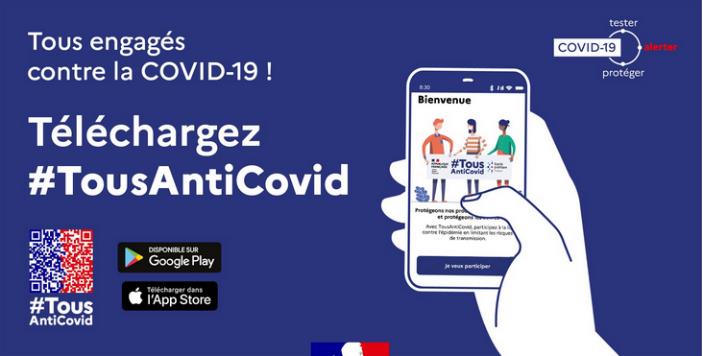
- Tracking: the app alerts users if they are inclose contact with a Covid patient
- Information: the app publishes the daily stats concerning the virus
- Testing: the app can be used to locate the nearest testing center
- Pass Vaccinal: the app generates a digital version of the Pass Vaccinal by storing the QR code found on vaccination certificates and COVID test results acquired in France.
More information here.
This app which uses Bluetooth technology for tracking and does not share personal identification information. Use of the app for everyone, including COVID patients, is voluntary. (TOUS ANTI COVID Tracking App)
o The French government has put in place a 24/7 hotline (in French only) to respond to any questions concerning COVID-19 (health, regulations, workplace, social services, legal, civil, childcare and education, travel and leisure activities, etc.). A WhatsApp group managed by the government provides an additional Q&A source for anyone who wishes to join: WhatsApp with Government, tel: +33 (0)7 55 53 12 12
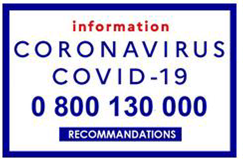
Higher Education
Frédérique Vidal, the Minister of Higher Education in France, presented detailed plans for a 100% in-person academic year 2021/2022 (“#MaReentrée2021”) in a July 9th press release : https://cache.media.enseignementsup-recherche.gouv.fr/file/; the contents of the press release are also available (in French ) in video format : https://youtu.be/M49z2pDF2TU
The Ministry authorizes French institutions of higher education to organize classes as they see fit, either in-person and/or remote, but they recommend that priority be given to face to face instruction, in particular for discussion sections (“travaux dirigés”). Priority should also be given (page 6 of PDF) to the in-person instruction of 1st year and international students.
COVID mitigation techniques and social distancing are still to be maintained within all university spaces and the Ministry is asking that all institutions put into place vaccination strategies and centers prior to the start of classes and to continue to make self-tests available to students.
Several official government websites give detail concerning academic and campus life during the COVID crisis.
• Ministry of Higher Education general Covid info
• Official student life website : Préparer ma rentrée 2021 : https://www.etudiant.gouv.fr/fr/rentree2021
International Students: International students continue to be welcomed into France provided they satisfy the French government’s current conditions of coming to France for participation in a short-term program or semester program (over 90 days). The French government has announced that international students currently in France can apply for and/or renew residency permits online.
International Students: International students continue to be welcomed into France provided they satisfy the French government’s current conditions of coming to France for participation in a short-term program or semester program (over 90 days). International students currently in France can apply for and/or renew residency permits, online, thus avoiding the previously obligatory in person appointment at the prefecture. (Campus France Stay Permit Renewal info).
Gatherings, Socializing & Cultural Activities
There are no longer any capacity limits in place for socializing in a group in public or in private. Barrier gests are recommended for places where large social gatherings take place.
Associated fines for not adhering to protocols
A fine of 135 euros may be applied in the event of non-compliance with COVID protocols such as wearing masks (https://www.service-public.fr/particuliers/vosdroits/F35351). Repeat offenders can be fined up to 3,750 euros and could risk 6 months of prison, community service, drivers’ license suspension of up to 3 years maximum.
Local travel restrictions
In France:
- There are no longer restrictions for travel within continental France or travel to Corsica.
- For travelers to French overseas territories and departments, information concerning travel restrictions can be found here: https://www.gouvernement.fr/info-coronavirus/outre-mer
Details concerning mobility in and out of France can be found at this French government site: International Mobility Information in French and in English at Advice for Foreign Nationals in France . Further information is also available on the European Union website: https://reopen.europa.eu/en/map/FRA
SPORTS AND EXERCISE
There are no more restrictions for sports or exercise since March 14th, 2022.
Student Support
The Ministry of Higher Education & Research has established a student mental health support website (with an English Language version) that compiles all the contacts and services related to mental health support for students during the COVID-19 crisis. The website covers all regions of France, and in addition to mental health support also serves as a resource for information about financial support, student housing, and health care. (https://www.soutien-etudiant.info/)
In addition, the government created in 20-21 a mental health care package (a “chèque psy”) to allow students in psychological distress access to free mental health support that they have renewed for 2021-22 (page 14, https://cache.media.enseignementsup-echerche.gouv.fr/file/2021/53/7/DP_ma_rentree_21x21_v12_1415537.pdf)
Several Hotlines and free resources are available to students:
• A free 24/7 hotline monitored by the Association SPS (Soins aux Professionnels de Santé) for students has been opened and can be reached here: 0 805 23 23 36 https://www.asso-sps.fr/
• https://www.nightline.fr/paris, a student proposed/supported hotline to support peers (non-professional) is available everyday between 9pm to 2:30am: +33 1 88 32 12 32
• The BAPU (Bureaux d'aide psychologique universitaires) have psychologists, psychotherapists and psychiatrists available to students in need. Addresses and contact information can be found here: https://www.etudiant.gouv.fr/fr/besoin-d-une-aide-psychologique-1297
• SOS Amitié at +33 9 72 39 40 50 (24/7 in French),
• SOS Help +33 1 46 21 46 46 (3pm-11pm, in English)
• Fil Santé Jeunes at +33 800 235 236 (9am to 11pm for ages 12-25).
Workplaces
Since March 14, the wearing of masks in the workplace has ended.
End of the protocol in the workplace with the help of a workplace reference guide.
The national protocol for workplace health and safety can be found here.
COVID Case Management in schools Higher Education:
ADDITIONAL LINKS & GENERAL RESOURCES

For information concerning every country in the European Union, and for details on all aspects of the Covid-19 crisis in Europe, see the following website: https://reopen.europa.eu/en/. And for information specifically for France: https://reopen.europa.eu/en/map/FRA
For current information, including health recommendations and measures, from the French government on the COVID-19 situation in France, see the following website: Main COVID-19 Government Website
Access to daily communiqués with daily statistics and key messages: Daily Communiqués by French Government
Official website dedicated to Student Life in the French universities: www.etudiant.gouv.fr
Timeline of government actions French Government Actions
